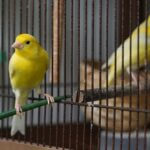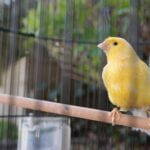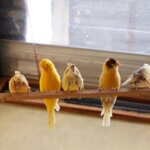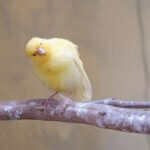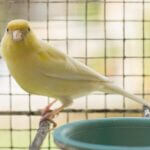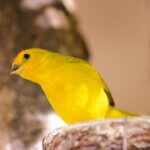Canaries are quintessential songbirds, prized for their ability to produce complex melodies. However, some people are more interested in their beauty and concerned about noise levels.
Perhaps you live in an apartment with thin walls or a shared home and can’t own a loud bird. Alternatively, you may want a lovely songbird, but not one that will disrupt your household.
The good news is canaries aren’t loud birds, especially if you get the right breed.
Are Canaries Noisy?
Despite their iconic singing, canaries are quiet birds and don’t reach the same decibels as parrots, such as cockatoos or macaws.
This is partly because they sing rather than scream and shriek. Instead, canaries limit their vocalizations to peeps, chirps, and melodic songs, much like finches.
Even when a canary is singing at full volume, it shouldn’t carry as far or pierce the ears. This makes them appealing pets for apartment buildings or shared living spaces.
Do Female Canaries Make Noise?
If you want an especially quiet canary, females are recommended. That’s because male canaries are the talented singers of the species and far louder than females.
This is especially true during the mating season when males constantly sing to get their mates’ attention. Female canaries rarely sing; if they do, they’ll loosely copy the male at a far lower volume.
In most cases, female canaries only produce soft chirps reminiscent of a finch.
Are Canaries Loud At Night?
Most canaries are quiet at night, as they’re daytime creatures that sleep at this time. Singing or making noise at night would only attract predators and place them in danger.
If your canary is still making noise at night, it may be due to a night fright. This happens when a canary is startled awake and enters a frenzy, believing that a predator is nearby.
Alternatively, the canary may be exposed to too much light at night, so it’ll believe it’s still day. According to Physiology & Behavior, canaries have a circadian rhythm like humans.
This is a sleep-waking cycle regulated by the amount of light in their environment.
When canaries are exposed to artificial light, their brains produce less melatonin (sleep hormone), thus causing the birds to stay awake and active.
The best approach is to cover the bird’s cage or turn off the lights when it’s time for a canary to sleep.
What Are The Loudest Canaries?
Certain canary breeds are louder than others; these varieties sing more intensely and produce more sophisticated tones and melodies. Some owners find this appealing.
Examples of vocal canary breeds include:
Spanish Timbrado
The Spanish timbrado is a recent breed of canary that was originally bred in Spain in the 1940s.
The name “timbrado” comes from the timbre of this breed’s metallic voice, and it’s reminiscent of castanets, which are musical instruments commonly used in Spanish folk music.
This canary breed is thought to be the loudest of all known canary breeds, characterized by its song as a “bell-like” warble. The Spanish timbrado is also famed for its impressive tonal range, with a mature bird capable of singing 12 different tones.
Also, unlike other breeds, the Timbrado is the only known canary breed wherein females are just as capable of singing as males, making them an exception to the rule.
German Roller
The German roller, also known as the Harz roller, is a domestic song canary from the Harz Mountain region in Germany. It’s one of the oldest canary breeds still in existence today, having been first bred more than 400 years ago.
Despite its petite size, the German roller is known for singing loudly, usually with its beak closed. This gives its song a uniquely low timbre that is less shrill than those produced by other canary breeds.
Russian Singer
The Russian singer canary is a popular song canary that has been bred for over 300 years. This breed is an excellent singer and good at mimicking sounds.
Past breeders often used the song of wild birds to train this canary to sing unique melodies. Although these learned songs aren’t passed down to the offspring of these birds, their mimicry skills are inherited.
Waterslager
The waterslager is a canary breed created in Belgium. It’s prized not only for its spectacular beauty but also for its remarkable song. This canary has the widest vocal range of all known breeds, capable of producing low and high tones.
The timbral repertoire of this songbird ranges from metallic, bell-like sounds to airy, flute-like sonic textures. Although it’s not as loud as the previously mentioned breeds, it can certainly belt out some majestic tunes.
American Singer
The American singer canary is a relatively new breed of canary, having been developed in the 1930s by breeding the German roller with the border fancy. While canary enthusiasts adore this breed for its intricate song, it’s highly sought after for its beautiful and vibrant plumage.
Due to its robust nature, the American singer is also a favorite pet bird for beginning owners, making it less prone to illness than other breeds.
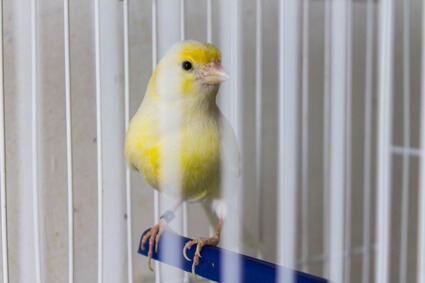
Why Is My Canary So Loud?
Even if you have a male or louder canary species, you may find it suddenly begins making far more noise than usual. This will be especially concerning if you own a female or a quieter breed that abruptly starts vocalizing at high volumes.
This may be normal, seasonable behavior or a sign that your canary is in distress. Let’s explore the main causes for a suddenly loud canary:
Breeding Season
According to Behavioral and Neural Biology, the crystallization of a male canary’s song usually coincides with the onset of the breeding season. This is because the ability of a male canary to sing plays a critical role in female mate selection.
Male canaries tend to sing loudest and most frequently during the breeding season. This occurs during the summer when sunlight is highest, and it’s natural behavior and will pass once the season changes.
However, if you expose your canary to too much artificial light, it may grow confused.
Discomfort
It’s not normal for a canary to scream or shriek loudly. However, a canary can make such noises if it’s experiencing pain from an injury.
Because canaries hide their illnesses and wounds, their first response will be to seclude themselves and remain quiet. If your canary is loud, an injury is likely severe.
Look for signs like bleeding, walking with a limp, and sitting at the bottom of the cage.
Scared
Canaries may scream if they believe they are in danger and can’t escape. Their first response is to hide or fly away, but if they can’t, they will resort to loud noises to scare off the predator or warn other birds.
For instance, if your dog barks next to the canary’s cage or a cat attempt to paw at it from the outside, the canary may begin screaming. This is usually matched with erratic flying and beating of the wings.
Bored
Canaries require mental stimulation to remain happy and healthy. They’ll become bored if they are kept in too small cages, lack decorations, and have no toys.
In most cases, this will follow a pattern of lethargy, then depression, then self-destructive behaviors, but if the boredom gets severe, it may also lead to screaming.
The canary will be expressing its emotional stress and trying to entertain itself. Once again, this is a severe case, and the canary will have tried everything else to alleviate its discomfort.
If it’s reached the point of screaming, your canary is highly stressed.


